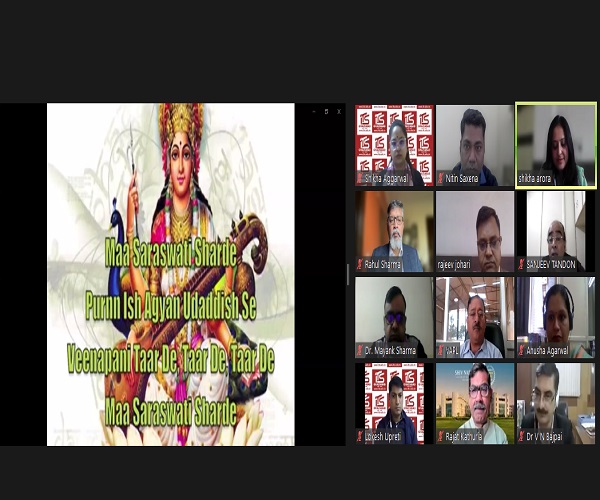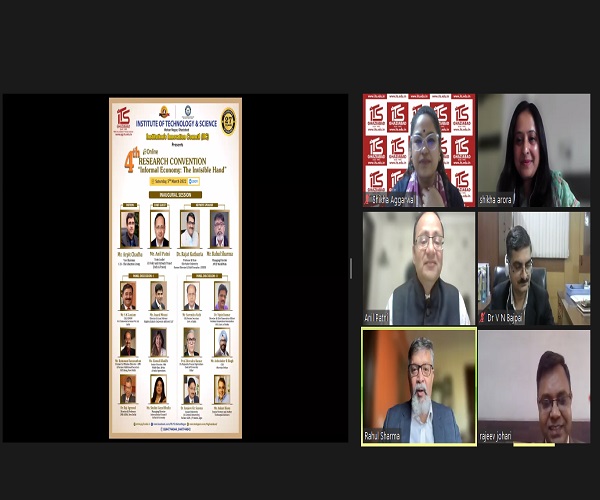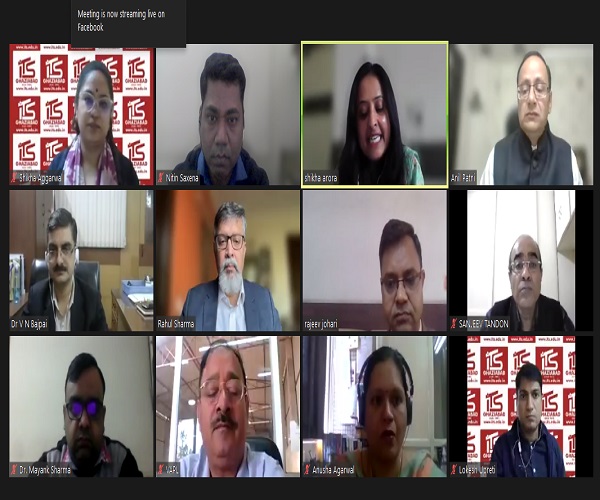
- itsmn@its.edu.in | 18003095855 | 8447744044 |

Latest Updates
The Institute of Technology & Science, Ghaziabad organized the fourth edition of Research Convention-2022 on the emerging and key theme of ‘Informal Economy: The Invisible Hand’ on 05th March, 2022.




This one day Convention was organized under the aegis of Institution’s Innovation Council (IIC), MIC-MoE and MSME. The convention witnessed a huge participation from industry and academia along with the students.
The event began with the auspicious lamp lighting ceremony and invocation of Goddess Saraswati. The convention commenced with the enriching address by Shri Arpit Chadha, Vice Chairman, I.T.S - The Education Group. He warmly welcomed all the eminent speakers and shared his valuable insights on the emergent theme of the convention, its role and importance to the Indian economy and involvement of youth to drive it coming years. He emphasised participants to take maximum learning from the deliberations of all the experts and practitioners to be shared across various sessions.
Prof. (Dr.) V.N Bajpai, Director Management presented the welcome address where he introduced the theme of the convention and shared his viewpoints on the informal economy and its relevance in today’s scenario. Dr. Rajeev Johari, Convenor provided the overview of the convention and the program flow.
The Inaugural session was graced by Mr. Anil Patni, Team Leader EU Policy and Outreach Project (India & France) as Chief Guest, Mr. Rahul Sharma, Managing Director, APCO World Wide and Dr. Rajat Kathuria, Professor & Dean, Shiv Nadar University, Former Director and Chief Executive Indian Council for Research on International Economic Relations (ICRIER).
Mr. Anil Patni, Team Leader EU Policy and Outreach Project (India & France), Chief Guest of the convention deliberated upon the importance of Informal Economy as being informal doesn’t means non-existent, and importantly it has a major part to play in GDP.
Mr. Rahul Sharma, Managing Director, APCO World Wide, as the keynote speaker expressed his thoughts over the emergent ‘Knowledge Economy’ giving its way to the gig economy wherein technology has proved to be the major enabler.
Dr. Rajat Kathuria, Professor & Dean, Shiv Nadar University, Former Director and Chief Executive Indian Council for Research on International Economic Relations (ICRIER), was the other keynote speaker who expressed concern over greater urbanisation and new characteristics of the city and its people who do not prefer to own assets.
The session was quite interactive as participants asked many relevant questions and the eminent speakers answered them to their satisfaction. At the end of the inaugural session, Dr. V.N Bajpai presented virtual plaques to all the honorable speakers as a token of remembrance and gratitude.
The first panel discussion involved Mr. S. K. Gautam, CEO, UDYAM; Mr. Ramanan Ramanathan , Former Additional Secretary NITI Ayog, New Delhi; Dr. Raj Agarwal, Professor and Director, CME-AIMA, New Delhi; Mr. Anand Mirani, Director & Lead Advisor, Simplus Exim & Corporate Advisory LLP;and Ms. Hanadi Khalife, Senior Director- IMA, Middle East, Africa & India Operations.
Mr SK Gautam initiated proceedings by speaking about “Informal Economy & Invisible Hand”. He shared data on the Indian government’s contribution to the startup ecosystem, also taking time to stress upon women entrepreneurship and their contribution to Indian economy.
Dr Raj Agarwal emphasised upon the collaboration between academia and industry for promoting an environment of entrepreneurship. He also spoke about the culture of entrepreneurship during the course of the globalisation, privatisation and liberalisation process.
Mr. Anand Mirani started his deliberation with a story of ants and stressed upon becoming butterfly in the times to come. He hoped that students would take the chance to explore possibilities. He highlighted entrepreneurial attitude, adaptability to change and VUCA world through various examples.
Mr. Ramanan Ramanathan stressed on various features of the Atal innovation mission along with the demographic dividend being exploited by India. He shared examples and quotations of Steve Job, Dr A.P.J Abdul Kalam and Swami Vivekananda to reinforce his concepts on innovations, creativity and entrepreneurship.
Panel Discussion 1 ended with the vote of thanks by Dr V.N. Bajpai and sharing of Plaque of Honor to all the panel members.
The second panel discussion included Mr Surendra Nath, IAS, Former Secretary, Govt. of India; Dr Vipin Kumar, Director and Chief Information Officer, National Innovation Foundation, DST, Govt. of India; Prof. Birendra Kumar, Dr Rajendra Prasad Agriculture Central University Bihar; Mr Ashwinder R. Singh, CEO, Bhartiya Urban; Dr Sanjeev Kumar Saxena, Assam University; and Mr Ankur Bisen, Senior Partner, Technopak Advisors.
Mr. Surendra Nath initiated the session by explaining the background of informal economy; how to increase the productivity of the informal economy; the working population of the country, core issues of employment & productivity; and how 40 crore people are engaged in different industries of which 20 crore in agriculture, 8 crore in construction, 5 crore in forestry, 4 crore in hotels, 2 crore in animal husbandry and 1 crore in handicrafts.
Mr. Sanjeev Kumar Saxena discussed about the resilience of the hospitality industry in Covid-19, including how the industry coped with revenue downfall because of foreign restriction and lockdowns. He further discussed how they have planned the strategic approach during the pre and post pandemic era.
Mr. Ashwinder R Singh expressed his views about the role of technology in the real estate sector and how residential real estate has grown in the last couple of years during the pandemic. He further explained some of the challenges for the real estate industry, such as the low rental rates.
Mr. Vipin Kumar discussed about the startups in the services sector and how they have grown into unicorns in a very short time. He went on to talk about employment generation with startups and experimentations in the food industry.
Mr. Ankur Bisen highlighted the importance of the informal economy in pandemic and how society needs to invest more in defining the informal economy. He also addressed issues like quality of employment, human rights, lack of framework in informal economy and economic growth of India.
Panel Discussion II was then concluded with the presentation of a virtual plaque of honour as a token of gratitude.
Overall the various sessions of the convention were very lively and instructive for all present. Students gained a variety of insights which are expected to broaden there horizons while also apprising them about opportunities coming up in a growing job market.